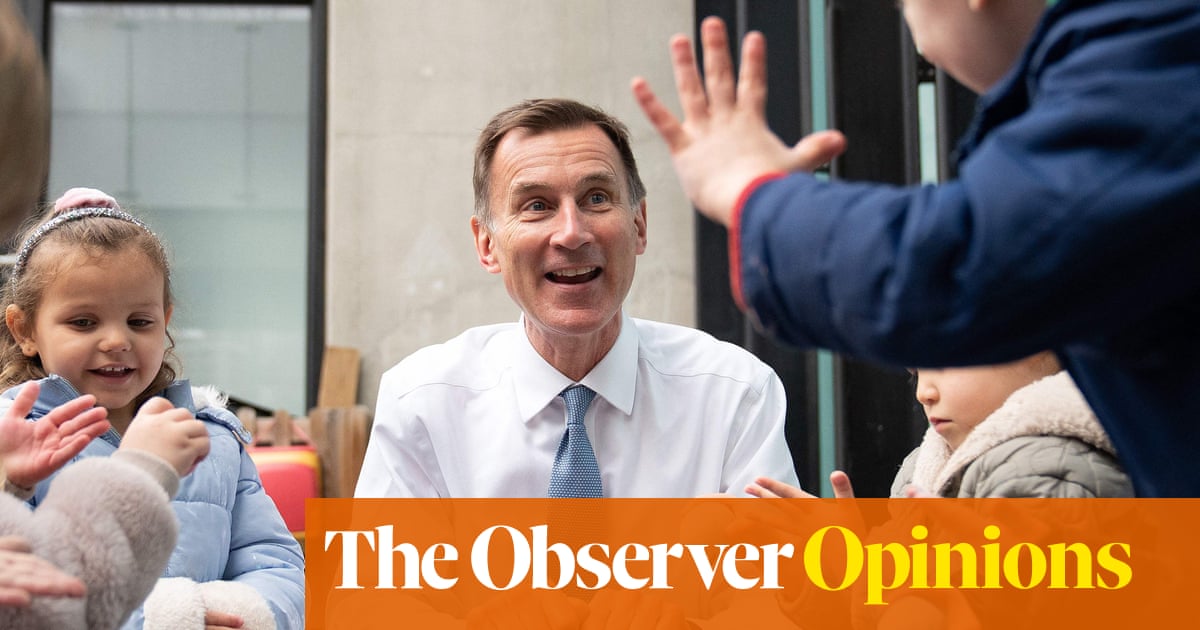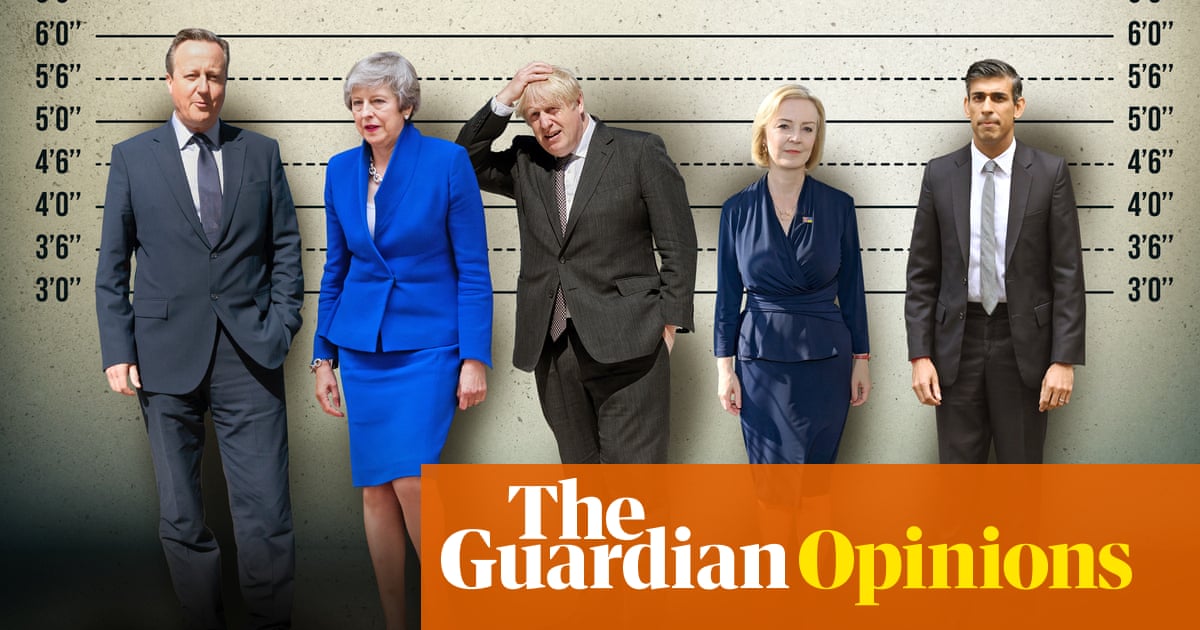
Here it comes. This Wednesday, the Department for Work and Pensions will finally end the £20-a-week “uplift” to universal credit introduced in March 2020. The cut will hit different households at different times, but it will formally arrive on the same day that Boris Johnson gives his big Conservative party conference speech in Manchester, which is sure to be full of boosterish talk about “levelling up”, the new global Britain – and, if recent announcements are anything to go by, the supposed prospect of a country that cannot currently feed itself becoming a major player in space exploration. On Earth, by contrast, millions of people’s sudden loss of £86.67 a month will inevitably trigger increases in debt, evictions and quiet, grinding want.
The surrounding picture only makes the cut look more cruel. Last week, the government’s furlough scheme came to an end, triggering fears of new redundancies and even more people being loaded into a benefits system that makes basic subsistence all but impossible. We all know about rising energy prices and food inflation. What the cut in universal credit will mean for lives already upturned by the pandemic hardly needs explaining; among other issues, in the midst of a crisis of childhood mental health, a change predicted to increase child poverty by nearly 300,000 children looks both reckless and nasty.
Yet the government machine speeds on. Last weekend, the transport minister, Grant Shapps, said the cut was happening “as we move back to people going back to work and more normal times”. The labour shortage is part of the mood music here, as if an abundance of opportunity awaits anyone who fears the breadline, when in reality the sectors short of workers – haulage, food-processing, hospitality – are often built around shifts and hours that rule most people out. And in any case, when 40% of people on universal credit are already in employment, “back to work” is an idiotic mantra indeed.
In his interview with Andrew Marr today Johnson insisted that the uplift was one of a package of Covid measures that are “no longer appropriate”. But behind the public intransigence, anxiety about the consequences of the cut is now swirling around Whitehall. The Department for Work and Pensions is said to be in talks with the Treasury about reducing universal credit’s so-called taper rate (at which benefits are cut for every additional pound earned from work, meaning that making up the lost £20 necessitates earning at least another £54) from 63p to 60p, which would hardly compensate for the imminent loss. Last Thursday, the government, belatedly responding to months of warnings about the cut’s effects, announced a new household support fund, which will apparently be administered by local councils. It is apparently aimed at “those most in need as we enter the final stages of recovery”, and offers help with such necessities as “food, clothing, and utilities”, but its inadequacies are obvious.
The annual impact of the cut will be around £6bn, but the fund totals £500m. It replaces a basic entitlement with a rationed, discretionary system, suddenly loaded on to local authorities starved of staff and resources. Note also that one of the most ingrained features of life on the social edge is the necessity of endlessly fighting your way through great tangles of form-filling and phone calls, and the chief effect of this move will be to increase it.
And so to the politics of all this. Particularly during the first lockdown, hopes briefly rose of a kinder, less punitive kind of welfare state, and the “uplift” seemed to indicate that even at the top of the government, some understanding of the impossibility of life for millions of people had sunk in. Now we see the most awful kind of rewinding. The pandemic has evidently not shifted the basics of benefits policy, and we are where we ever were: people who need help endlessly being kicked around, while politicians crow about the character-building wonders of work, and present an inhuman, endlessly “conditional” system as being simply what the public wants.
But I wonder. The idea of the benefits system as a grudging last resort for people who have to be stopped from milking it (“welfare”, as opposed to the postwar idea of social security) is getting old now. To some extent, it has its roots in the New Labour years, with Tony Blair’s push on what he called “welfare to work”, and the kind of messages put out by his successor (it is good to see Gordon Brown saying that the cut is “the most morally indefensible thing I’ve seen in politics”, but worth remembering such headlines as “Gordon Brown to crack down on benefit cheats in Queen’s speech”). The stage was thus set for David Cameron and George Osborne’s cynical distinctions between workers and mere claimants, and the way that the then Work and Pensions secretary, Iain Duncan Smith, introduced universal credit amid a drive to cut benefits spending, and an array of brutal changes: the hugely increased stopping of people’s benefits, the arbitrary and stupid benefit cap, disgraced work capability assessments, the bedroom tax. The system was by now inherently punitive: give or take the softening of some rules as the pandemic took hold, this is where we have been ever since.
But as the cruelties were ratcheted up – not least for disabled people – there was an inevitable pushback. An array of social media voices and bloggers have done amazing work shining light on seemingly endless iniquities and outrages. The number of food banks began to hugely increase around a decade ago: they may be open to allegations that they have normalised hunger, but they also give poverty a visibility and urgency – and, via things as mundane as public food-collection points, a nagging presence in everyday life. The concept – and awful reality – of “holiday hunger” started to get attention around 2014. Last year, the work done by the footballer Marcus Rashford on the same issue marked a big shift; now, his loud opposition to the universal credit cut only underlines the fact that, thanks largely to non-politicians, questions about poverty and benefits can no longer be pushed to the margins.
In a political mainstream too often dominated by ideas about “welfare”, there are reasons for guarded hope. How Keir Starmer’s talk about a “contribution society” (in which life chances will apparently be decided on the basis of “hard work and how you contribute”) will manifest itself in policy is something that needs to be vigilantly watched – but his party is committed to replacing universal credit with “a better system”, changing the “perverse” taper system, and scrapping both the two-child limit on child benefits and the benefit cap.
In Brighton last week, the Greater Manchester mayor, Andy Burnham, wandered around the conference fringe making the case for a universal basic income. A repentant Stephen Crabb, Duncan Smith’s short-lived Tory successor at the DWP, says that the idea that “if you can only just make welfare that bit tougher … you’ll get better engagement with the labour market” has no basis in the evidence; Cameron’s former speechwriter says that the cut to universal credit “will be felt in countless domestic catastrophes and indignities”. Maybe, just maybe, the kind of thinking that has ruined so many lives is slowly falling apart, but there is a characteristic cruelty in one inescapable fact – that it is going to take even more suffering and pain to quicken its demise.











